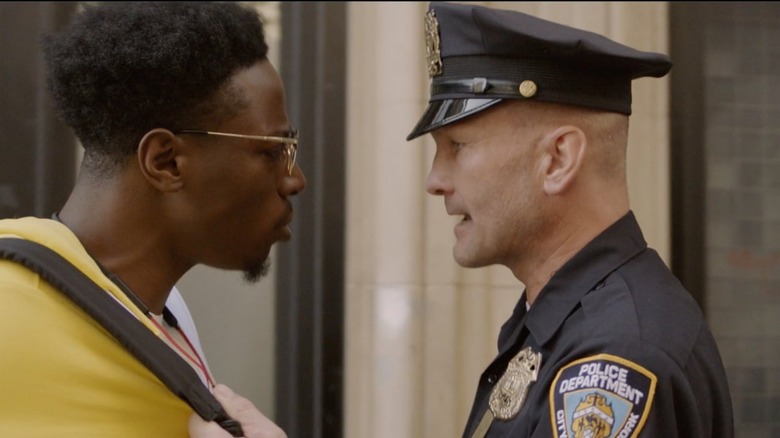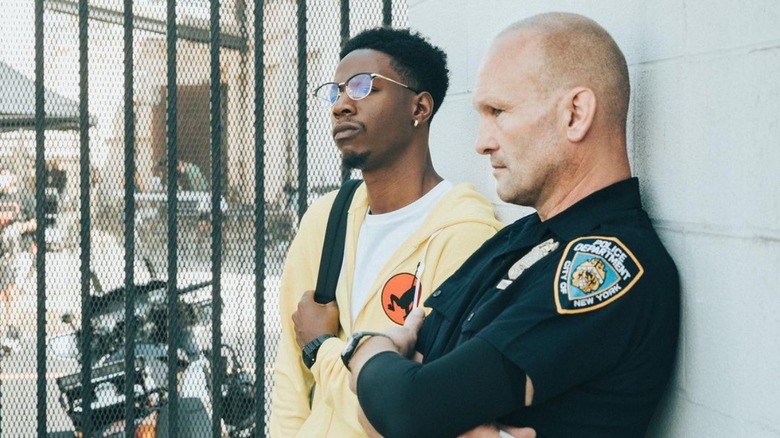The Ending Of Two Distant Strangers Explained
Now that it's a minted Oscar winner, "Two Distant Strangers" has generated quite a bit of interest on Netflix. The short film, which was directed by Travon Free and Martin Desmond Roe, tells the story of a young black man named Carter James (Joey BadAss), living in New York City, who is trying to get home to his dog in the aftermath of a first date. On his way home, he's confronted by a police officer named Merk (Andrew Howard), and is eventually killed by the police.
The movie takes place in a time loop, which means that Carter keeps trying to go home, and the police keep confronting him before he can make it to his destination. Carter is confronted and killed by police 99 separate times, including one iteration where the apartment of his date is raided, and it turns out that the police have the wrong apartment.
After 99 deaths, Carter confronts Merk, the police officer who has killed him most frequently, and explains the situation in the hopes that the two of them can come to a new understanding. The film's ending makes it clear that a new understanding may not be possible.
Two Distant Strangers has an incredibly bleak ending
In the final moments of "Two Distant Strangers," Carter explains the time loop to Merk, and proves it to him by predicting everything that's about to happen around them. Carter then asks Merk to drive him home. The drive proceeds without any problems, and when they arrive at Carter's apartment, it looks like Carter might be home free. As Carter turns around and tries to enter his apartment, though, Merk breaks out in spontaneous applause.
He congratulates Carter on his "performance," revealing that he also remembers the time loops, and was just playing along when Carter approached him. Merk then shoots Carter, killing him, and blood begins to pool around Carter in the shape of Africa. Merk says, "See you tomorrow, kid," and Carter wakes up again, forced to find another way to make it home alive without being killed by police.
The ending is about a cycle of police violence
The final moments of "Two Distant Strangers" reflect the cruelty that some officers show in their treatment of Black people. It's a moment when Carter tries to reach out with compassion, explaining the situation to Merk in a way that might be able to lead them to common ground. Instead, Merk rejects that outreach, and chooses to perpetuate a cycle of violence between Black people and the police even though he doesn't even have a fake reason anymore.
It's a bleak ending, but it's also one that doesn't offer any easy answers for those trying to find a way to fix the problem of police brutality in America. Instead, it seems to suggest that the cruelty is at least partially intentional.
The premise of "Two Distant Strangers" has come under fire because of the incredible violence and cruelty that it depicts. The film is, for some, triggering, and there are many who argue that it doesn't have anything new to say about the problem of police brutality.
The creative team behind Two Distant Strangers has been accused of plagiarism
In addition to the controversy around the content of the short film, there's also accusations that the core idea for "Two Distant Strangers" was plagiarized. That film, which was written and co-directed by Travon Free, has been taken to task for its close similarities to the 2016 short film "Groundhog Day for a Black Man," which was created and directed by Cynthia Kao.
In a viral TikTok video posted in May, Kao claimed that the idea for the Netflix short was stolen directly from her. Those claims have not been verified, and Free has responded to the claims by saying that the idea for the short film was original, and came from him. Although the emphasis on police brutality that both films have is worthy of discussion, the accusation around the plagiarism accusation has pulled focus toward a different controversy surrounding the film. For one reason or another, the ending of "Two Distant Strangers" created a huge dialogue.



